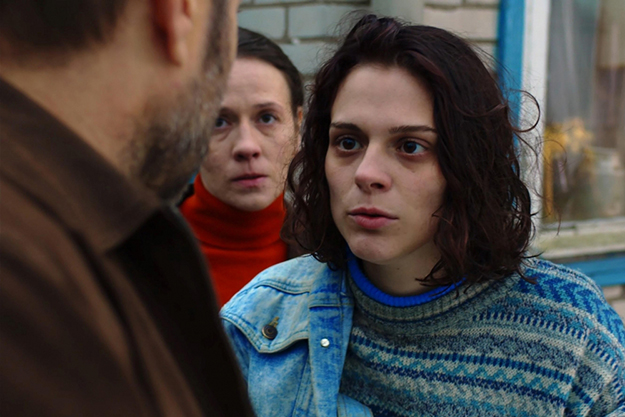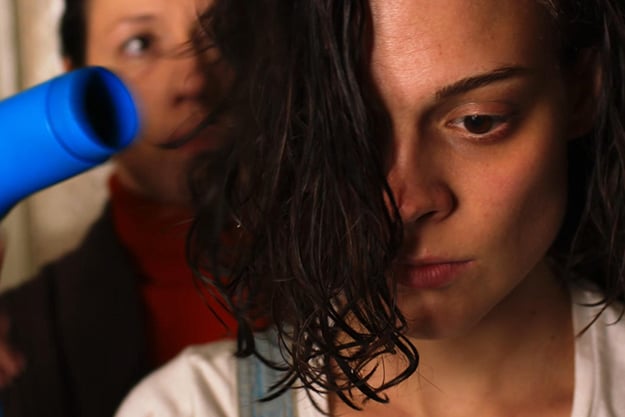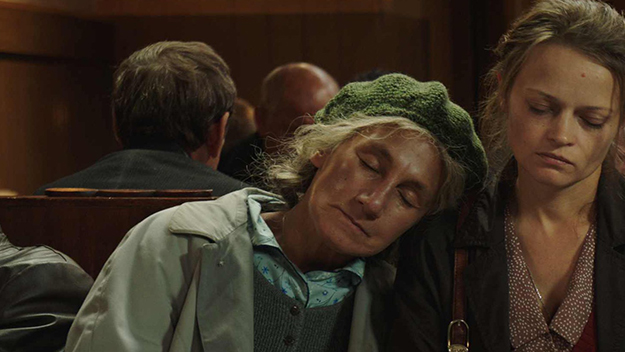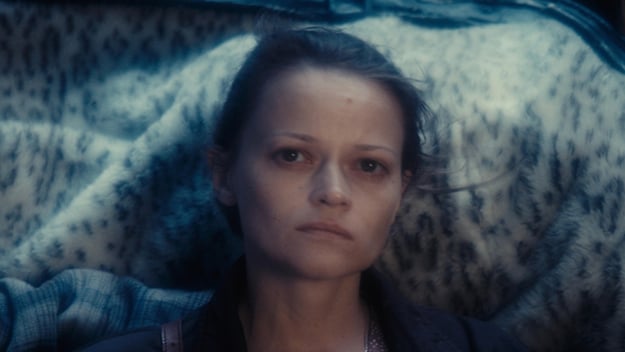Films of the Week: Cannes Week 2 – Russian Stories

Closeness
This year has not been a goldmine for out-of-the-blue discoveries in Cannes, but the Un Certain Regard section provided a significant, if flawed, minor-key debut from a director who should be worth keeping an eye on. Tesnota (Closeness) is the first feature by Kantemir Balagov, a young director who studied under Alexander Sokurov in Nalchik, in the Kabardino-Balkarian Republic, north of Georgia. The film doesn’t feel remotely like Sokurov, being nearer in its claustrophobic visual style and its dramatic concentration to the Dardennes. But Balagov, especially in his exploration of family dynamics and in his stylized use of color, establishes a signature very much his own.
It’s also—along with Léonor Seraille’s Jeune femme, the other Un Certain Regard discovery—one of the prime rebel-girl films of the festival. Balagov’s heroine is 24-year-old Ilana, or Ila (Darya Zhovner), who works in her father’s car-repair shop in a tightknit Jewish community. Ilana, we learn at the start, doesn’t speak the regional language of Kabardian, and is something of an outsider in her own world: refusing the “good daughter” role her mother wants to impose on her, she shuns dresses and the use of a hairdryer, preferring overalls and a bulky jean jacket, and is content to carry on working with her dad fixing cars rather than court whatever more status-laden job the local rabbi can offer. Crisis hits the family when Ilana’s brother David—with whom, it’s hinted, she has some sort of quasi-incestuous bond—is kidnapped, along with his fiancée from another Jewish family. The two families make a collection—but there’s only enough ransom to free one captive.
Given how tightly enclosed Closeness is, both in the tight parameters of its milieu and visually—the film is shot in Academy ratio, giving it an extremely claustrophobic look—Balagov is able to provide a surprisingly dense evocation of a closed world and its inhabitants. Although much of the film shows us a limited number of characters conversing in small rooms, we get a considerable amount of social background to a story that, subtitles inform us, actually happened in Nalchik in 1998, when the story is set (at the time, Balagov has pointed out in interview, kidnappings were common there). A small cast offers a well-limned sketch of the Jewish community on one side—the fiancée’s family, the rabbi and congregation, the no-nonsense criminal godfather who offers to help out, i.e. buy the family out of their business—and the Kabardians on the other, represented by Ila’s garage-hand boyfriend, Zalim (Nazir Zhukov), and his buddies, with whom Ila gets high on crack. And in the background is the unrest in the former Soviet republics, as Zalim’s friends sit around and watch, at great length, what could well be an authentic video showing a man being killed by soldiers in Chechnya (“Next!” an officer calmly barks when the deed is done).

Closeness
Amid the cruelty and despair, Ila maintains sanity above all by not giving a damn. Required to meekly acquiesce at a gathering intended to cement what will effectively be a forced marriage, Ila calmly hisses, “I’ll fuck everyone,” ensuring her family’s exclusion and pariah status for herself. The film perhaps leans on us a bit heavily to admire her, given that for much of the running time she’s seen with the image of a roaring lion on her denim jacket. Still, she’s played with utter believability, and in one of the festival’s more memorable performances, by newcomer Zhovner, who on this showing seems to establish a niche as Russia’s own Kristen Stewart.
The film is uneven and doesn’t quite sustain its 118-minute running time—it certainly suffers a drop in intensity when, toward the end, we see daylight and sky for the first time—but while it still keeps those family tensions alive in the confines of DP Artem Yemelyanov’s frame, it’s really something. The use of color to cut through the surrounding drabness of Ila’s world—especially its saturated, somewhat chemical blues and greens—is distinctive too. Closeness isn’t a bombshell, but in a lackluster year, it helped restore some edge.
The Russian film that all hopes were riding on in competition was Andrei Zvyagintsev’s Loveless. While a lot of people took it to their hearts, and while I felt his last film Leviathan fully deserved its praise—and should have had the 2014 Palme d’Or—Loveless felt too heavy-handed to bring off the lesson that, like so many of this year’s competition films, it was determined to impart (to wit: cellphones + social media = the Moral Vacancy of Our Age). The other Russian film in competition means a lot more to me, and although I can see how it too might be accused of heavy-handedness, its approach feels very true to the Russian literary tradition that underlies it. A Gentle Creature (Krotkaya), by Ukrainian director Sergei Loznitsa, is based on a Dostoevsky story—the same one that inspired, among other films, Bresson’s Une Femme douce and Raphaël Nadjari’s 1998 New York story The Shade.

A Gentle Creature
Loznitsa’s film, however, seems to have little relation to its ostensible story beyond its title and a certain Dostoevskian spirit. I hesitate to say too much about it because end-of-festival exhaustion caused me to doze off at some points, so until I return to it at a later date, here’s the gist. It’s about a nameless, and almost silent woman (Vasilina Makovtseva) who has attempted unsuccessfully to send a parcel of much-needed supplies to her husband, who’s in prison on what is probably a trumped-up charge. Given permission to visit him, she sets off with her package on a long journey to the “prison town”—an entire settlement that lives as an adjunct to the prison, and is entirely dependent on it. Refused permission to enter, she spends the night among a crowd of uproarious boozers who try to coerce her into a game of strip spin-the-bottle. She tries to get entrance again, and is refused, but is told she can complain to the relevant authorities —only no one will tell her where those authorities can be contacted. Later, visiting a human rights office that’s under permanent vindictive siege from the very citizens that it is designed to help, she learns that if you do file a complaint, you’re guaranteeing persecution for yourself.
The woman, effectively, has entered a very special hell—a vast prison system that spreads beyond the bounds of the jail itself. Everyone who comes near the prison is absorbed into its galaxy—there’s an entire population of prostitutes whose sole function is to service prison workers. Violence is everywhere: through the windscreen of a police car, we see two men brutally beat a third, ignored by the cop in the car, until he goes over and calmly shakes the assailants’ hand. A highly textured soundtrack occasionally yields overheard snatches about mutilation and corpse disposal. The compassionate woman who runs the civil rights office appears to be in a permanent state of breakdown, and who can blame her?
And yet, all through, the gentle woman of the title, grim as her blasted facial expression always is, maintains not only her tenacity but also a sort of dogged innocence under fire. The film’s final section goes into surprising territory—especially surprising, perhaps, for Loznitsa, with his documentary background. The woman falls into slumber among a multitude of sleepers in the railway station waiting room—seemingly a purely phantasmagoric image, and yet the very one that Loznitsa previously recorded in his extraordinary 25-minute documentary The Station (2000). She’s then awakened and summoned to the door by a woman who says there’s help for her. There she’s met by police and whisked off in a horse-drawn troika into the realm of highly stylized, rather Felliniesque dream, which eventually turns into an intense and upsetting nightmare. The dream sequence goes on for quite some time, and is not a little repetitive—it consists partly of previously glimpsed characters returning to make speeches, interspersed with farcically ceremonious brass fanfares. I have heard complaints that the film, booed at its press screening, is redundant, overly insistent, repetitive—but that seems to me to be part of the point. We often accept that great literature, especially of the past, will be, and sometimes needs to be repetitive, even boring—but we don’t like to accept it in films. And yet A Gentle Creature requires the seemingly suffocating and oppressive textures of its dream sequence—which feels perfectly of a piece with a grotesque tradition of nightmare horror in Russian literature, which runs from Dostoevsky and Gogol in the 19th century to satirist Vladmir Sorokin today.

A Gentle Creature
I have also heard people protest that conditions in Russia can’t possibly be as bad as this film suggests—what Loznitsa is showing us is the rancid back-of-beyond flip side to the glossy emotional desert of Loveless’s Moscow story. But the director has previously depicted Russia as a country that’s still, in many ways, trapped in the horrors not just of its 19th century but also an older past. In his similarly horrific fiction My Joy (2010), it’s suggested that anyone misguided or unfortunate enough to drive off a main road in the deep Russia of small villages is risking descent into madness and violence: the dilapidated settings, the faces of the haggard wrecks and drinkers of A Gentle Creature say as much. It depicts the Russian experience as an intersection between Dostoevsky and Kafka, although that doesn’t quite begin to capture its extremity—or suggest the redeeming grain of hope that, despite everything, its heroine embodies. Loznitsa’s film is the one competition entry in Cannes this year that I absolutely want to see again—and not just for the moments that sleep made me miss.
Jonathan Romney is a contributing editor to Film Comment and writes its Film of the Week column. He is a member of the London Film Critics Circle.





